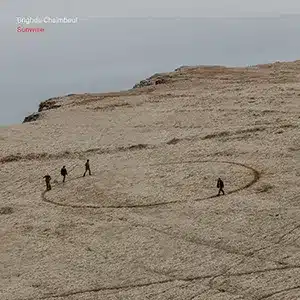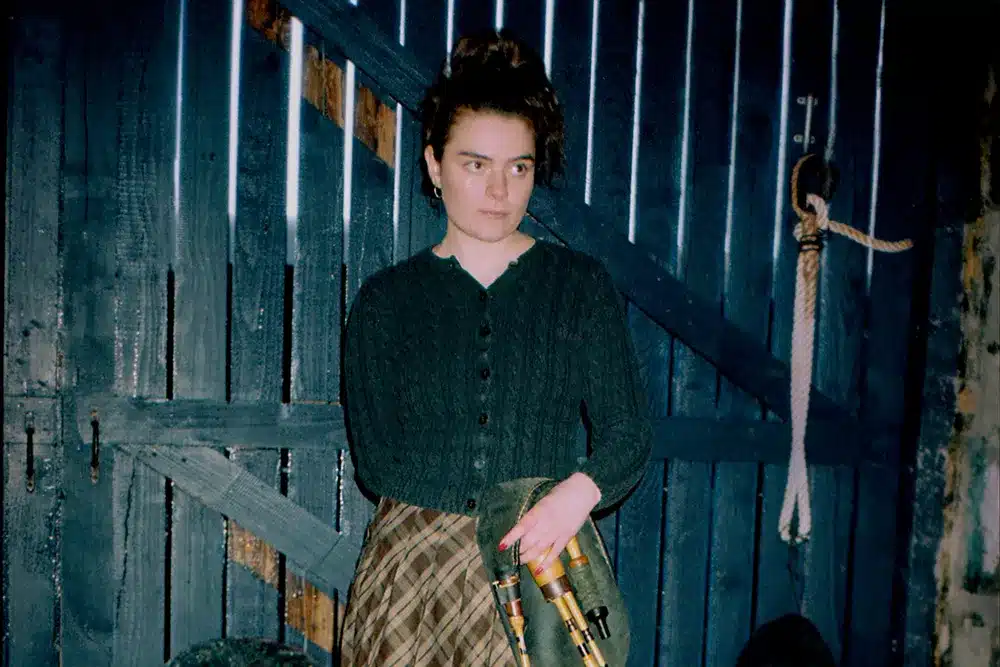
Brìghde Chaimbeul honors the power of bagpipes not with staid repetition but with an appreciation for tradition’s dynamism and outstanding technical skills.
 Sunwise Brìghde Chaimbeul tak:til / Glitterbeat 27 June 2025
Sunwise Brìghde Chaimbeul tak:til / Glitterbeat 27 June 2025
Sunwise, the new album by Scottish smallpipes player Brìghde Chaimbeul, begins with a drone. It features almost six minutes of that drone, a risky and utterly transfixing move that clears the way for Chaimbeul to march forth and pipe with wild abandon. What emerges is astounding work, Chaimbeul’s approach to the bagpipes as deeply rooted as it is innovative. Capable of exceeding exponentially their players in volume, endurance, breadth, and depth, bagpipes are instruments unique among winds for their sheer force, and Chaimbeul’s curiosity and skill make for earth-shaking new music based on centuries-old repertoires and archival materials.
Chaimbeul’s virtuosity is evident. Once the initial drone gives way on the first track “Dùsagh/Waking”, a gentle melodic line runs up and down atop it, carrying the album into the more quickly rolling “A’Chailleach”. Here, Chaimbeul sings, her voice breathy but steady enough to hold its own alongside the pipes and saxophone courtesy of Colin Stetson. The arpeggi that roll up and down as the track ends are nothing short of electric (metaphorically speaking), giving the entire piece a cosmic feel.

“Kindle the Fire” follows, an interlude of crackling wood burning and low-hanging clouds. It offers just enough time to let the experience of hearing “A’Chailleach” settle. Then, it immediately leads into the opening blasts of “She Went Astray”, a quick round for which Chaimbeul cites a 1934 recording as an archival source. It’s the record’s sharpest hit, followed by “Bog an Lochan”, a dizzying jig tinged with chaos and again underpinned by satisfying drones.
Perhaps the most extraordinary demonstration of pipe versatility is “Sguabag/The Sweeper”, throughout which a marvelous jumble of squawks, squeals, hums, and cries gradually coalesces and evaporates in echoing synchrony. Almost meditative is rippling “Duan”, modeled after the processional songs of Gaelic Hogmanay rituals and featuring Seamus Heath on reverent organ in the piece’s last and most vibrant instrumental segment. Once Chaimbeul’s and Heath’s respective sounds die down, Aonghas Phádraig Caimbeul recites a Hogmanay ballad through a layer of what sounds like vintage tape haze.
The album concludes with a minute-long song, “The Rain Is Wine and the Stones Are Cheese”, a festive tune in which Chaimbeul engages in the practice of canntaireachd–vocalizing bagpipe music as a system of learning–and thus closes the work with a final evocation of tradition. It’s not that what Chaimbeul does is so far from the common notions of folk music that have for so long permeated the world music market. She is so well-versed in her instrument’s roots that her performances ring sincere not only at their most familiar but also at their most expansive.
Sunwise is fresh, an album that takes seriously the power of the bagpipes. Brìghde Chaimbeul honors that power not with staid repetition but with an appreciation for tradition’s dynamism and outstanding technical skills. Though she’s still a young artist, she’s covering exciting ground. It’s easy to imagine her taking the smallpipes even further beyond any existing preconceptions of what her instrument is meant to do.


